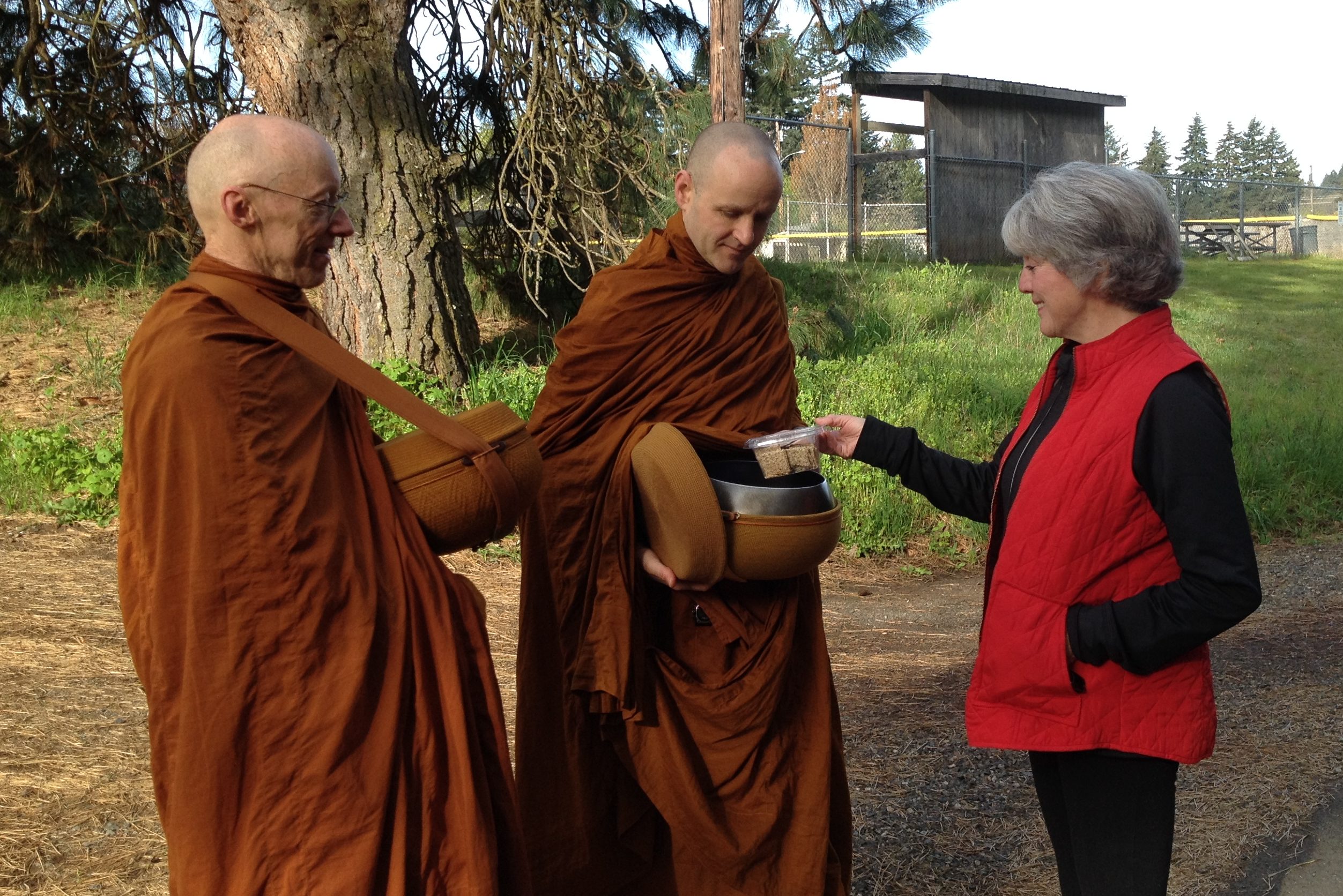Tradition of Offering Support

During the Buddha’s time, he established a unique and radical relationship between the monastics and the lay community, which continues today in the Theravadan tradition. The monastic code requires the ordained Sangha to live in dependence upon the laity for all their physical needs. Monks and nuns do not grow or prepare their own food, and they can only accept food that is freely offered by laypeople. This tradition has been successfully implemented for more than 2500 years.
Important Message About Offering Meals
During this these unusual times of the Coronavirus, we ask those making in-person meal offerings to please adhere to specific instructions to ensure the safety and health of the Pacific Hermitage monastics and all who visit. Please review these Meal Offering COVID-19 Procedures closely prior to your visit (and they may change as circumstances do). Important note: all in-person weekend meal offerings must be calendarized in advance through the Hermitage Dana-Coordinator, since in these times, unfortunately, there can be no unscheduled meal offering visits.
Offering Alms Food
Each morning the monks walk through White Salmon accepting donations of food. This traditional monastic practice provides the opportunity for local members of the community to connect with the monks and contribute to their sole meal of the day. Please feel free to approach them with any questions or offerings you may have.
The daily alms-round is from 7:30 AM – 9:30 AM. You may also bring food to the Hermitage around 9:45 AM am if you can’t connect with the monks on their alms-round. There are four basic alms round routes (maps), but they are flexible and can change, so please check them regularly. Click here for options on how to offer alms food, or contact the Meal Dana* Coordinator.
Please note that because of monastic training rules, the monks only eat between dawn and midday, are unable to cook food, and can only eat food received that same morning.
Offering a Meal at the Hermitage
Offering food to the monks provides an opportunity to visit with monks and historically, this is the traditional time to visit a monastery, ask questions and consult with the monastics.
After the meal, the monks are available for discussion and consultation. At 1 PM, the monks return to their hermitage schedule.
Several people may offer a meal. You might like to prepare and offer a meal with a group of friends. Also, even if someone has already signed up on the calendar to offer a meal, you are more than welcome to offer dana, too. Just inform the Meal Dana Coordinator of your plans.
Some people may wish to offer a meal on a regular basis. If you want to schedule a meal offering on the same day each week or month, let the Meal Dana Coordinator know and she will put your name on the calendar for those additional days.
As mentioned above, it is imperative to review the Meal Offering COVID-19 Procedures closely prior to your visit. Also, all weekend in-person meal offerings must be calendarized in advance through the Hermitage Dana-Coordinator.
*From Wikipedia: Dana is a Sanskrit and Pali word that connotes the virtue of generosity, charity or giving of alms.
Needed & Useful Material Items
Material requisites that the monks can receive directly or by post.
Direct Link: http://goo.gl/RZSTr8
Monetary Donations
Although the monks can not receive or accept money, financial support for the Hermitage is both necessary and appreciated. For information about offering donations, please visit Sanghata.net or email dana@sanghata.net. Sanghata is a lay board that receives all donations and manages Hermitage finances.
Offering Services
Occasionally the hermitage needs volunteer support for various tasks and professional services: landscaping & grounds maintenance, transportation, construction, and website development—to list some examples. If you would like to volunteer your support please contact the monks at the hermitage.
Community Work Days
Outside of the winter retreat period, we host five or six ‘Garden Parties’. These days provide the greater lay community an opportunity to come out and support the monastery, with a central theme as well as many smaller projects in an afternoon work session. Please come for all or just a part of the day and join us for the meal offering. These days are listed on the Events Calendar, announced on the News blog, as well as the email list.
The History of Offering Help
During the past 2,500 years support for the monastic life has been entirely provided from lay supporters through daily acts of generosity. In this spirit, support in the form of work, money, foodstuffs, building materials or other help is both appreciated and needed. Your generosity allows the spiritual community to survive and to flourish. Contact the hermitage for details. The steward of the monastery, Sanghata, is a 501 (c) (3) nonprofit organization and donations are tax-deductible.
Buddhism has managed to keep intact over the centuries the rich and vital interrelationship between lay and monastic communities set forth by the Buddha. Theravada monastics, although renunciants, are not permitted to be recluses. To ensure this the Buddha required that they be totally dependent upon the lay community for their physical support. Monks and nuns cannot handle money and they can only eat or drink that which is offered to them. At the same time, the monastic community provides an important function for the lay community by caring for their spiritual needs, and by providing moral and spiritual teachings and examples. The two communities, each essential to a balanced society, support and enrich one another.
For the lay community in the West, it is important to understand how the monks and nuns of the Theravada Buddhist sangha live from day-to-day. In Thailand the monastics are visible each morning, walking through the nearby villages with their almsbowls, receiving offerings of food for their daily meal. The Thai culture is one where the lay community fully acknowledges the dependence of the monastic community for physical needs such as food, cloth, and the requisites for their life. The monastics, because of their vows of renunciation, cannot buy these basic items for themselves. If the laypeople do not provide for them, they will go without. If we do not feed them, they will not eat. If we do not provide for their electricity bill, they will have no heat. If we value the presence of the monastic community it is important that we remember they need our support. The relationship that develops through this commitment to mutual support is a rewarding one, and the spiritual friendship between lay and monastic communities is a precious gift.
